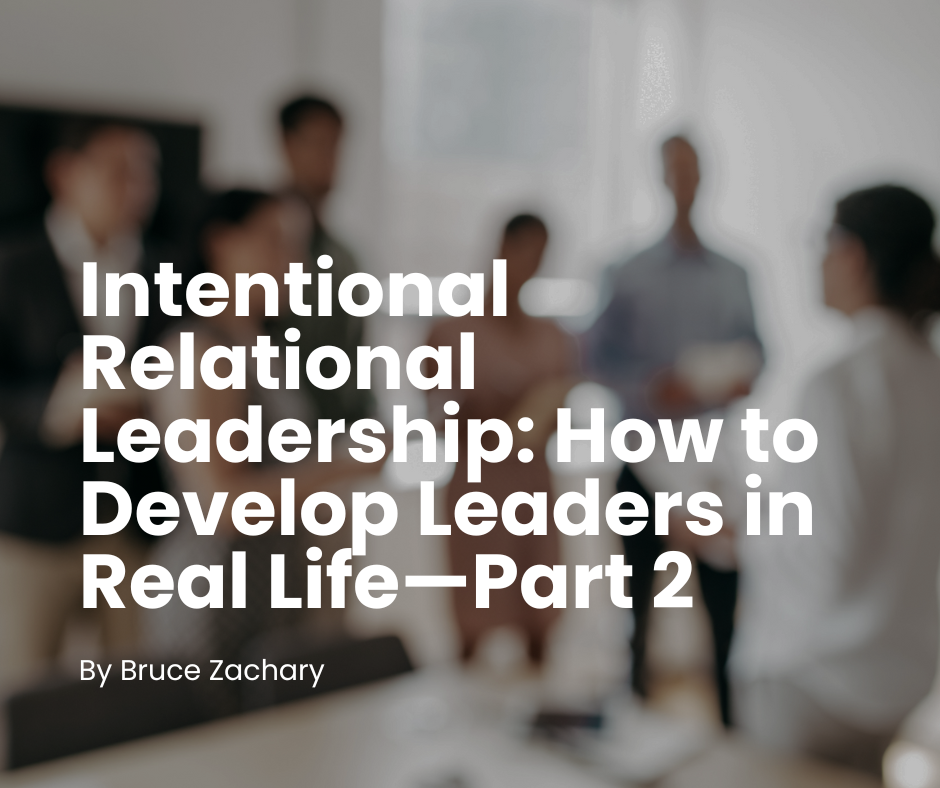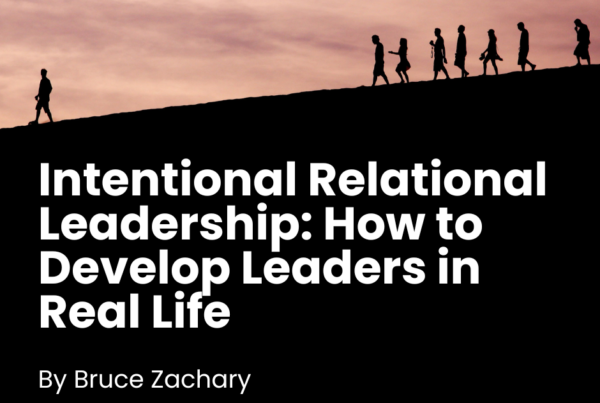
Editor’s Note: This is the second article of a three-part series on how to develop disciples who will, in turn, make disciples of others. Click here to read the first article, published on March 22, 2024. In addition, Bruce Zachary will provide an overview of this process during the workshop on Intentional Relational Leadership at the CGN International Conference June 23-26 in Costa Mesa, California. You can read Bruce’s free ebook for “Intentional Relational Leadership” by clicking the link here.
“And the things that you have heard from me among many witnesses, commit these to faithful people who will be able to teach others also” (2 Tim. 2:2).
There are some disciple-making principles that are effective and replicable regardless of culture and the relative spiritual maturity of the persons involved. The essence of developing disciples who will disciple others requires each of us to engage, equip, empower, and evaluate. Let us begin to consider the elements of engage and equip.
A. Engage:
Generally, when you begin to develop disciples, you will engage them. As you continue to develop disciples, you may discover that you are being engaged by others to share your wisdom, insights, experience, and expertise. Nevertheless, the considerations related to engagement are consistent regardless of who initiates the relationship.
Here is an overview of considerations that you will likely address in the engagement phase:
1. Create a group to develop: Focus on developing the disciples who are most likely to create kingdom influence. Generally, meet one-on-one, or one-on-few, because their goals will differ.
2. Clarify goals and desired outcomes: Identify no more than four desired outcomes (targeted goals) that are likely to create the greatest impact.
3. The frequency, length, and duration of meetings: Will you meet weekly, twice a month, or monthly? A helpful rule-of-thumb is 90 minutes every two weeks. In regard to duration, plan to meet for at least 6 months. You want to focus on developing proficiency for meaningful and significant desired outcomes and these take time. For example, if you are mentoring someone to be proficient (e.g., 7 or better on a scale of 1-10) in Bible learning, Bible teaching, prayer, administration, delegation, communication, etc.) and you only meet twice a month for 90 minutes, it will take at least six months. So, plan accordingly.
4. The use of Action Items: At the conclusion of every meeting, agree upon work that the disciple will perform between meetings. These may include reading, listening to a podcast, online research, or other exercises. The Action Items should be targeted towards the disciple’s desired outcomes and be deemed reasonable to the disciple and mentor. For example, if the disciple has 3 hours to devote to gaining proficiency between meetings, then the Action Items should be presumed to require 2.5 hours. This leaves some margin for the unexpected. These should be agreed upon at the conclusion of each meeting and discussed near the start of each subsequent meeting. Evaluate progress made, and whether the workload was too heavy, light, or just right for the disciple.
5. Cultivate a relationship and make progress related to tasks: The desired outcome is cultivating a relationship between mentor and disciple and developing proficiency for a targeted task. Relationship forging takes time and is unlikely to flow according to schedule. You can plan to devote 15 minutes to forging relationship, but if the disciple (or mentor) is struggling with life, the boundaries are going to shift. Make sure that you are making progress related to task, but do not forsake relationship in the quest to reach a desired destination as quickly as possible.
B. Equip:
It is critical to remember that a mentor-disciple relationship is intended to equip a developing leader to be more proficient. You want to prepare them to ultimately reach a desired destination. This might be accomplished through providing helpful resources and tools, and imparting perspectives. Here are some considerations:
1. Character is foundational. Be sure to model Christlike character (1 Cor. 11:1; 1 Tim. 3). Be an example of character worth following. As you work with developing leaders, there will undoubtedly be multiple occasions where a character issue arises. Do not neglect to address character issues simply because you are focused on developing task proficiency. Christlike character will always be the foundation for healthy, effective ministry. So, when issues arise, speak the truth in love to ensure Christ-honoring development (Eph. 4:15).
2. Communicate care, compassion, and commitment to the developing leader. The most effective mentors understand that the relational component of development is likely more significant than training for task proficiency. If character is the foundation for developing a leader, then empathy is the next layer in the proverbial pyramid. Mentors who effectively communicate care, compassion, and commitment to help develop disciples are modeling likely the most important characteristic for healthy long-term leaders. If you model this well, your relationship with the disciple will continue past the planned time of engagement, and they will likely reproduce healthy disciples and leaders.
3. Determine strengths. Help developing leaders determine their strengths or God-given gifting (Rom. 12:6). Where does this leader get “A” results without extraordinary efforts? What gifting or abilities do those who work regularly and closely with the leader recognize? What are they passionate about? What are they highly motivated to do? How does/can this disciple leverage their strengths to get to the desired destination? Focus on developing strengths and areas approaching proficiency rather than trying to improve areas of weakness.
4. Help disciples to create roadmaps. Avoid the temptation to tell them every step of the map, and instead help them to map out a course that they believe will get them to the desired destination. Asking questions and cultivating self-discovery will generally be better in the long run.
5. Model task proficiency when mentoring. When mentoring you are likely to be modeling as a means to equip. An effective model to equip can be described as follows:
I do, you watch.
I do, you help.
You do, I help.
You do, I watch.
You do, someone else watches.
This is a model that Jesus utilized with the disciples. The end result is that the disciple will often replicate their mentor’s approach. For example, we see Peter being used to restore life to Tabitha (Ac. 9:36-41) and adopting a methodology that he had seen demonstrated by Jesus related to the restoration of Jairus’ daughter (Mark 5:21-24, 35-43). When mentoring for task proficiency, help people to see what you do, and help them to learn why you do it.
So, as we contemplate a disciple-making process we need to better understand how to effectively engage and equip. In the next article, we will explore how to empower and evaluate like Jesus with His disciples. If you want to learn how to make disciples more effectively, please join me for a workshop at the Calvary Global Network (CGN) International Conference and we can discover together the personal and kingdom benefits of intentional relational leadership.









